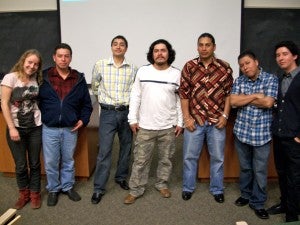Film Screening: Igual Que Tu
Posted in Events

Film maker Ellie Walton, and her collaborators Noe, Shorty, Benjamin, Anibal, and Gato, and Kalmanovitz Initiative undergraduate assistant Joaquin Recinos-Walsh.
Matthew Gladden of the Woodstock Theological Center at Georgetown reflected on his experience attending the Kalmanovitz Initiative’s screening of Ellie Walton’s film Igual Que Tú.
I decided to attend the screening of Igual Que Tú because I’d found the Kalmanovitz Initiative’s previous events to be very educational, and had heard wonderful things about the filmmaker, Ellie Walton. But I really wasn’t sure what to expect. I have little understanding of labor issues; and as someone who was born into a comfortable middle-class family in Indianapolis—and now spends most of his waking hours staring at a computer screen in an office on Georgetown’s campus—I wasn’t sure whether I’d be able to identify with anything in the stories of migrant day laborers, whose days were so full of hardship and uncertainty over where their next job (and meal) would come from.
But as the film began, and I was pulled into the stories of the people appearing on-screen, I quickly realized that the differences between my experiences and theirs weren’t an obstacle to my appreciating the film; rather those differences were exactly the reason why I needed to see the film.
Usually, the documentaries I’ve seen are about some exotic, far-off place or people or circumstances. But as I watched scenes from the Home Depot parking lot that I’d glimpsed so many times from the window of a Red Line train, I realized this was the first time I’d watched a documentary and felt, ‘This is about my world! I know these places. I know these people. I’m involved in this story.’The film was grounded in the familiar settings of ‘my’ DC; but it forced me to recognize that DC wasn’t really ‘mine’ at all—that it belonged just as much to those day laborers. It reminded me that the DC that I saw from my limited perspective was only one facet of the ‘real’ city, in which human beings experience challenges and struggles and triumphs so different from my own. And now, through the courage of the people sharing their stories on-screen, I was starting to hear those stories.
I feel grateful and privileged that I was able to view the film, and glimpse the realities of life as a migrant day laborer that Ellie Walton and her collaborators have so powerfully captured on-screen.
